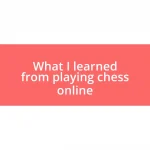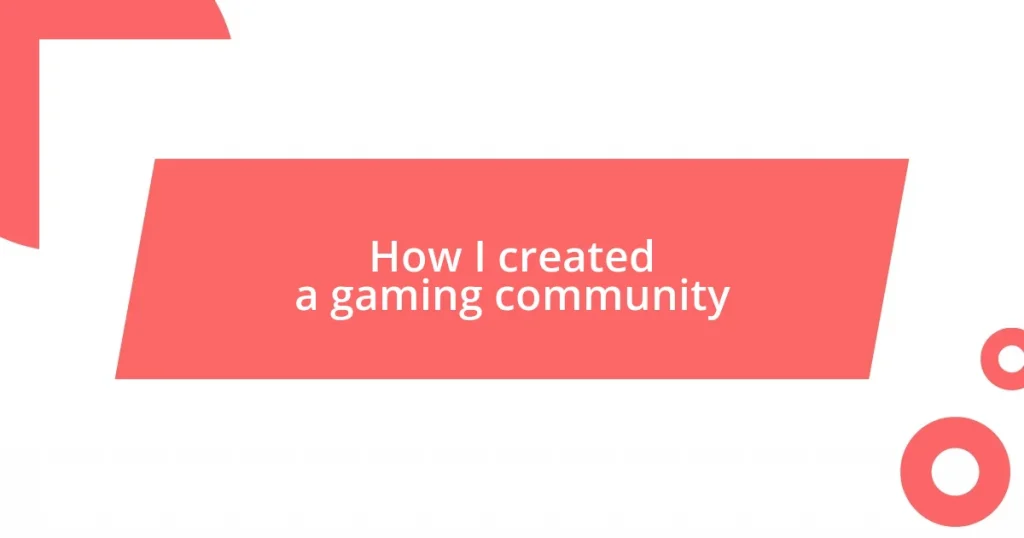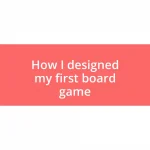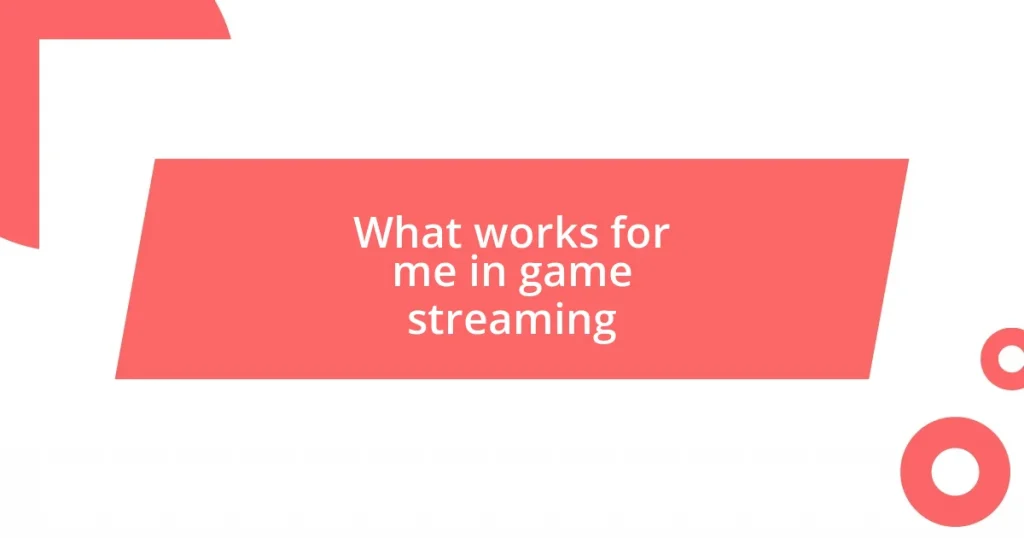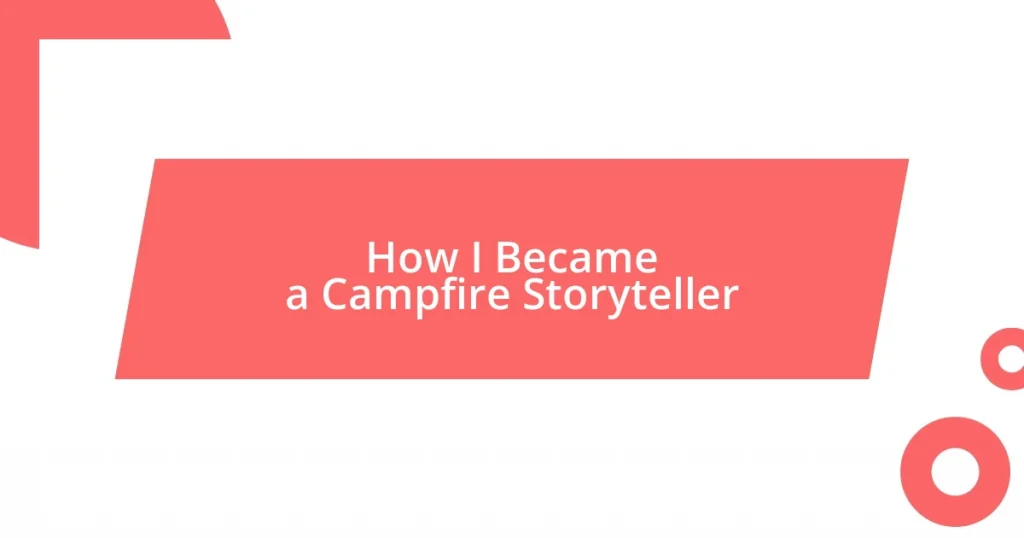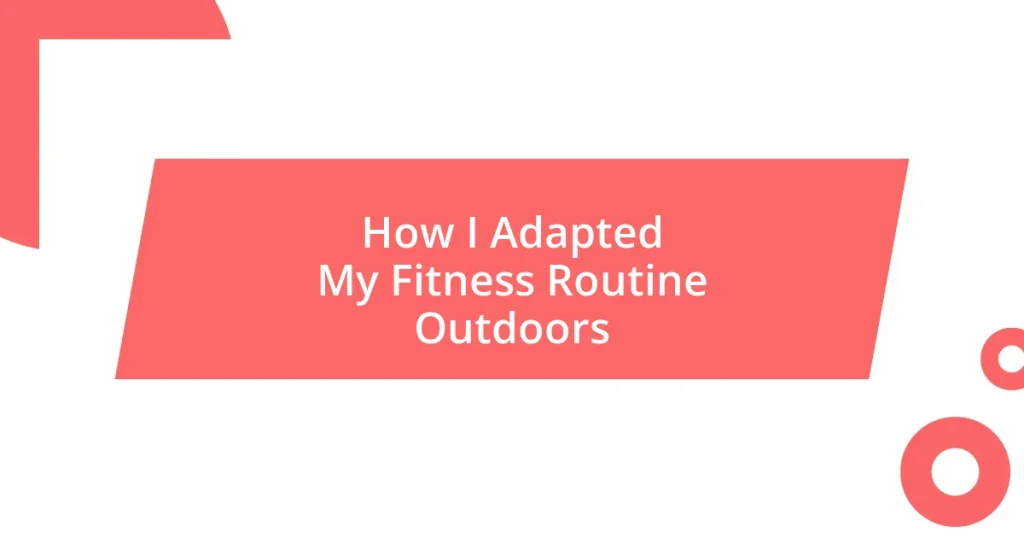Key takeaways:
- Choosing a gaming niche aligned with personal interests fosters community engagement and emotional connections among members.
- Building a strong foundation requires inclusivity, effective communication, and mentorship, encouraging participation from diverse backgrounds.
- Engaging and promoting the community through events, feedback, and partnerships enhances member involvement and attracts new participants.
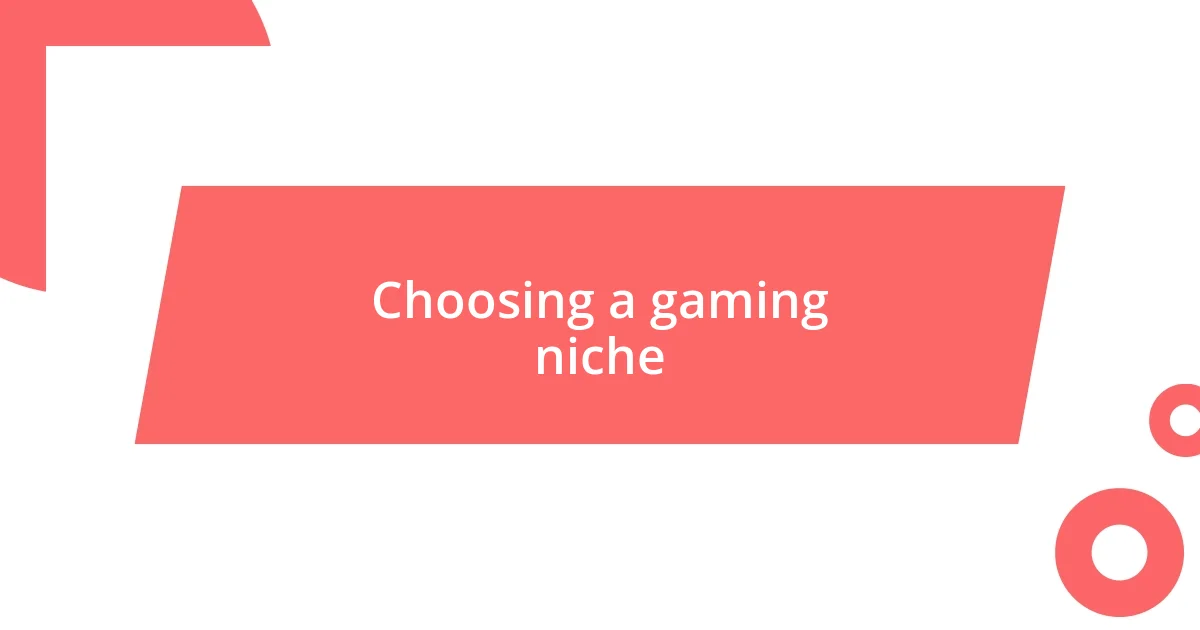
Choosing a gaming niche
Choosing the right gaming niche is crucial for building a dedicated community. Reflecting on my own experience, I remember when I first decided to focus on indie games. It wasn’t just about the games themselves; it was about connecting with passionate developers and players who shared that underdog spirit. Each game felt like a hidden gem, waiting to be discovered, and that excitement fueled a vibrant dialogue among community members.
When you think about your niche, consider what genuinely excites you. Ask yourself: What games do I love to play, and why? I’ve found that sharing my enthusiasm for strategy games allowed others to resonate with my passion. We could dive deep into game mechanics, discuss tactics, and even collaborate on strategy guides. The shared interest in these games formed a bond that transcended simply playing together; it led to friendships both online and offline.
Don’t overlook the need for a targeted approach. In my journey, I discovered that creating a niche focused on retro gaming attracted a unique crowd who appreciated the nostalgia. It wasn’t just about the games, but the stories, memories, and emotions tied to them. This emotional connection can be a powerful catalyst for community engagement and ensures members feel invested in the group’s identity. How about you? What emotional ties do you have to the games you love?
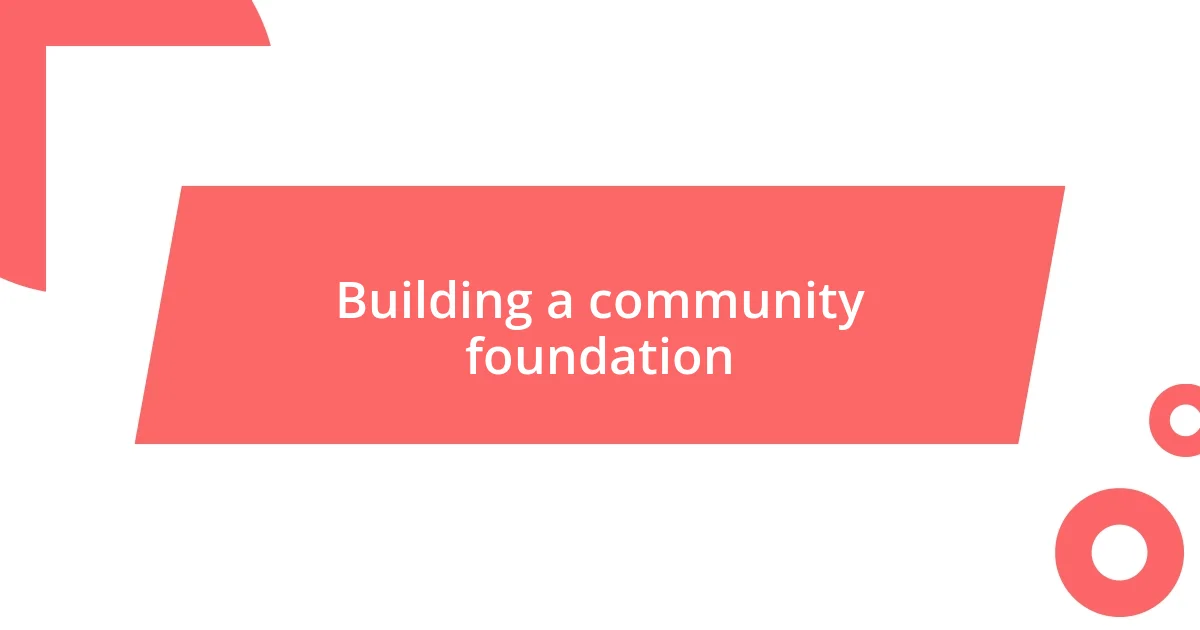
Building a community foundation
Building a strong foundation for a gaming community requires more than just a shared interest in games; it’s about establishing core values and guidelines that resonate with members. I remember the excitement I felt when founding my community, where we prioritized inclusivity. By actively promoting a welcoming environment, we encouraged participation from diverse backgrounds. Each voice added a unique perspective, enriching our discussions and making the group even more vibrant.
Community engagement thrives on effective communication strategies. During my early days, I implemented regular events like game nights and forums for idea-sharing. These became essential touchpoints, allowing members to bond over shared experiences. I vividly recall a particularly memorable gaming marathon where laughter and friendly competition built connections that felt almost familial. Such events foster a sense of belonging, making members feel valued and encouraging them to contribute their ideas and feedback continuously.
Defining roles and responsibilities within the community can also significantly impact its growth. I adopted a mentorship approach, encouraging experienced players to guide newcomers. This method not only empowered leaders within the group but also helped newcomers assimilate faster. Watching friendships blossom from these mentor-mentee relationships was heartwarming, as players supported each other’s journeys, further cementing our community foundation.
| Aspect | Details |
|---|---|
| Core Values | Inclusivity and collaboration are prioritized to enrich discussions. |
| Engagement Strategies | Organize events to foster connection and belonging. |
| Roles and Responsibilities | Encourage mentorship to strengthen community bonds. |
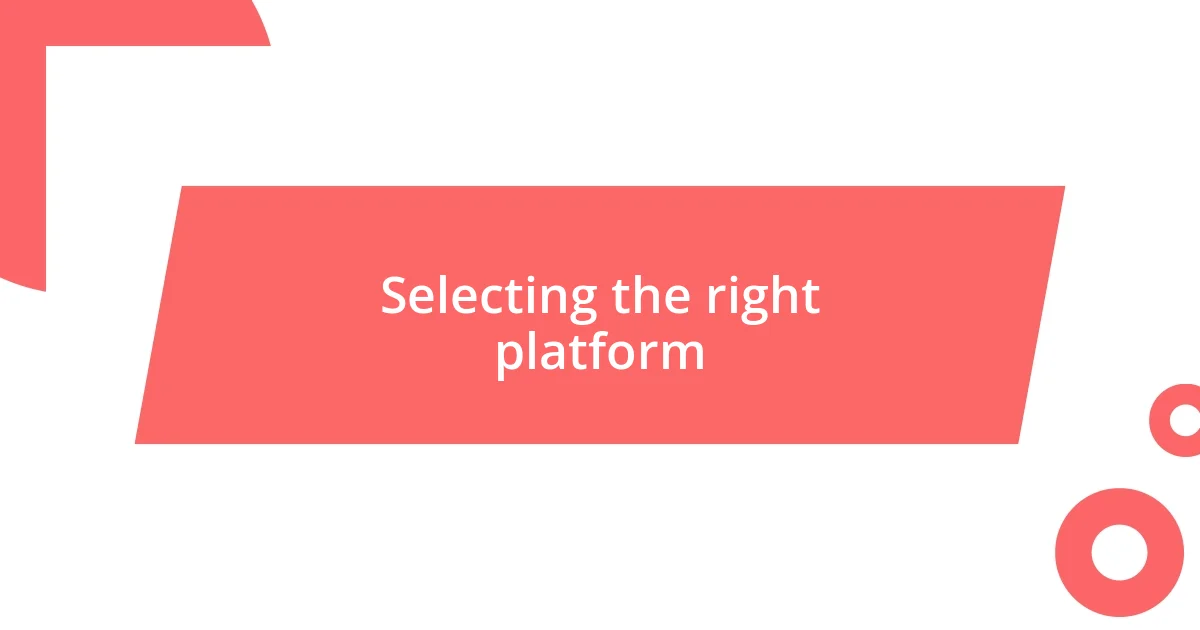
Selecting the right platform
When selecting the right platform for your gaming community, I found it essential to match the platform’s features with the needs and preferences of the members. Each platform has its unique strengths, from Discord’s real-time chat functionality to Reddit’s threaded discussions. Personally, I felt that choosing Discord was a game-changer for my community, as it facilitated both quick interactions and organized channels where topics could be deeply explored. It created a sense of immediacy; I can still remember the thrill of getting instant feedback during live game discussions.
Here are some key aspects to consider when selecting your platform:
- User Experience: Evaluate how intuitive and user-friendly the platform is. Members shouldn’t feel overwhelmed trying to navigate it.
- Features: Look for functionalities like voice chat, moderation tools, and integration with games that enhance interaction.
- Accessibility: Make sure that the platform is easily accessible on various devices, so members can engage whenever and wherever they choose.
- Community Size: Select a platform that can accommodate your projected growth, ensuring room for more members as your community expands.
Ultimately, matching the platform with your community’s vibe is what makes or breaks the experience for everyone involved. The right choice not only promotes engagement but also strengthens the bonds among members, leading to a thriving community atmosphere.
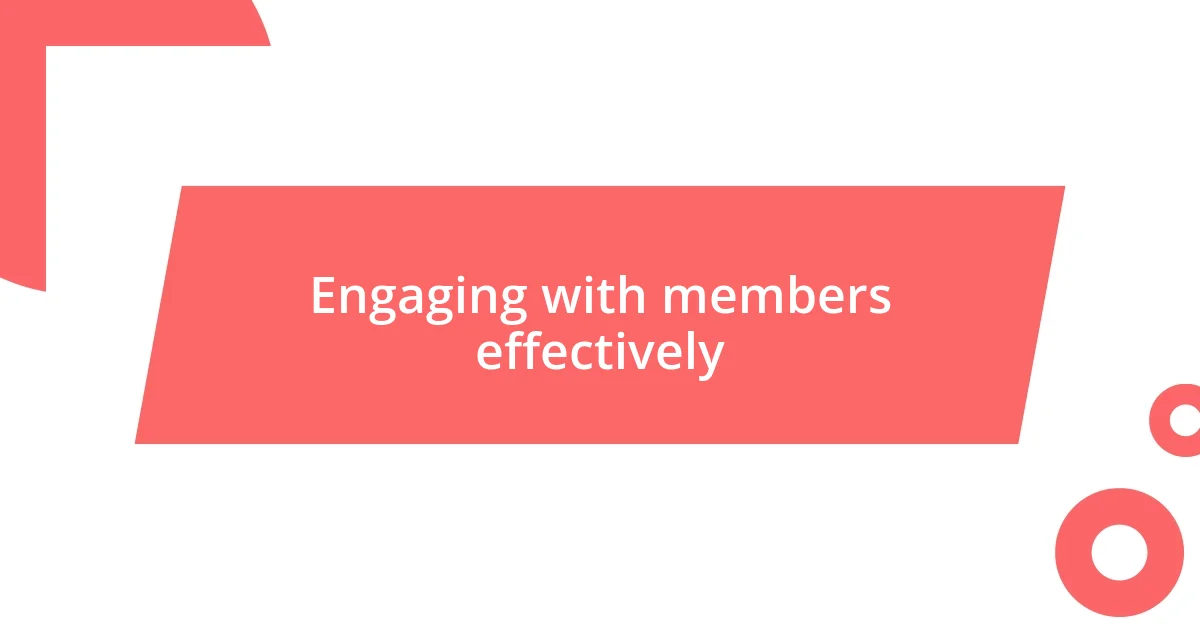
Engaging with members effectively
Engaging with members effectively requires an understanding of their motivations and interests. I’ve found that open dialogue is key; whether it’s through casual chats or structured forums, making yourself approachable invites members to share their thoughts freely. Have you ever noticed how a simple “What do you think?” can lead to a flood of ideas? When I began asking for feedback on our gaming events, the response was overwhelming. Members felt heard, and their suggestions led to even more exciting activities.
Utilizing fun polls and surveys can also work wonders in gauging interest and preferences. I remember creating a poll on our next game night theme, and the competitive spirit was palpable! Everyone seemed eager to participate, and it sparked friendly debates about favorite genres. This not only kept the community engaged but empowered members to feel a sense of ownership in decisions that shape our group’s identity. Incorporating their input mattered; it showed that their voices count.
Building a robust engagement strategy means being consistent and creative. I discovered hosting regular themed nights significantly increased participation, and it gave everyone something to look forward to. Picture this: a night dedicated to retro gaming, where everyone remembers their childhood favorites. It felt like a warm trip down memory lane, reminding us all why we love gaming in the first place. Keeping things fresh keeps the excitement alive, and I’ve seen firsthand how this keeps members coming back for more.
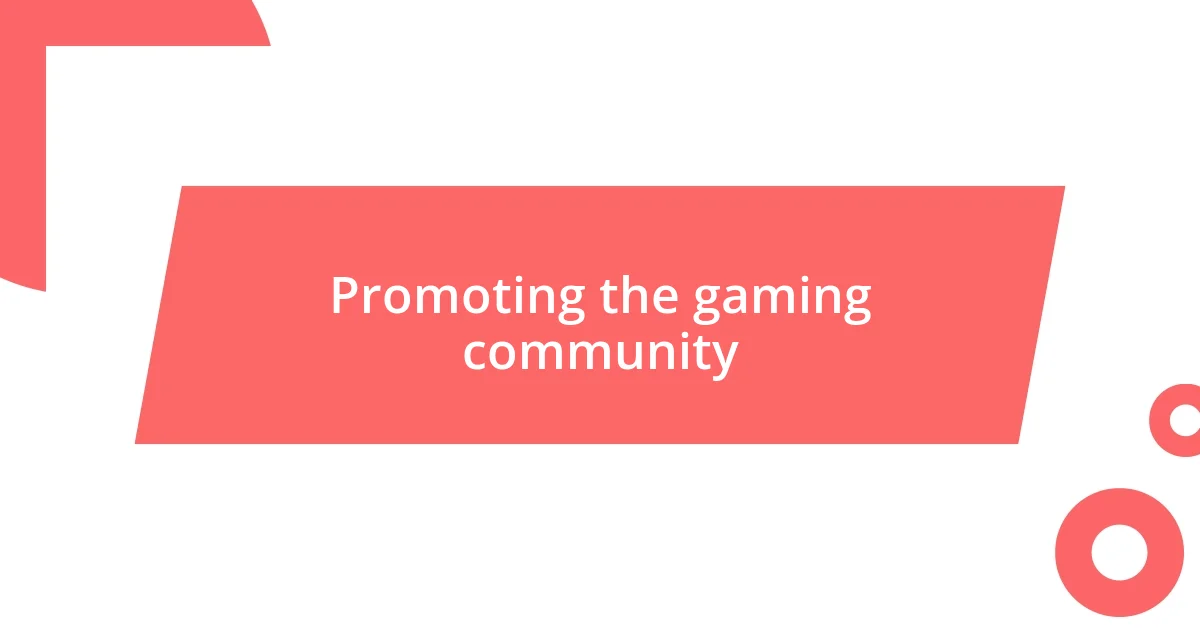
Promoting the gaming community
Promoting your gaming community involves more than just getting the word out; it requires creating an inviting atmosphere that naturally attracts new members. I remember posting a highlight reel of our best gaming moments on social media, and the response was electric! Those snippets not only showcased our vibrant community but also sparked curiosity among casual gamers who wanted to join in on the fun. Have you ever thought about how visual content can tell a story? It’s captivating and can really draw people in.
Another effective strategy for promotion is partnering with streamers or influencers within the gaming community. When an influencer shared our server link during a live stream, I watched our numbers grow in real-time—there’s nothing quite like that rush! Collaborating with people who already have an engaged audience can do wonders, as it lends credibility to your community and introduces your group to a wider circle of potential members. It’s a win-win: they gain content, and you gain exposure.
Lastly, consider hosting events that can be showcased publicly, like tournaments or themed game nights. I once organized a charity gaming marathon, and the turnout was beyond what I expected. Not only did it help us gain traction locally, but it also united our existing members under a meaningful cause. Promoting your community in this way not only increases visibility but also fosters a sense of purpose among members, strengthening those connections that make gaming so special. Why not consider what impact your community could have with a similar event?
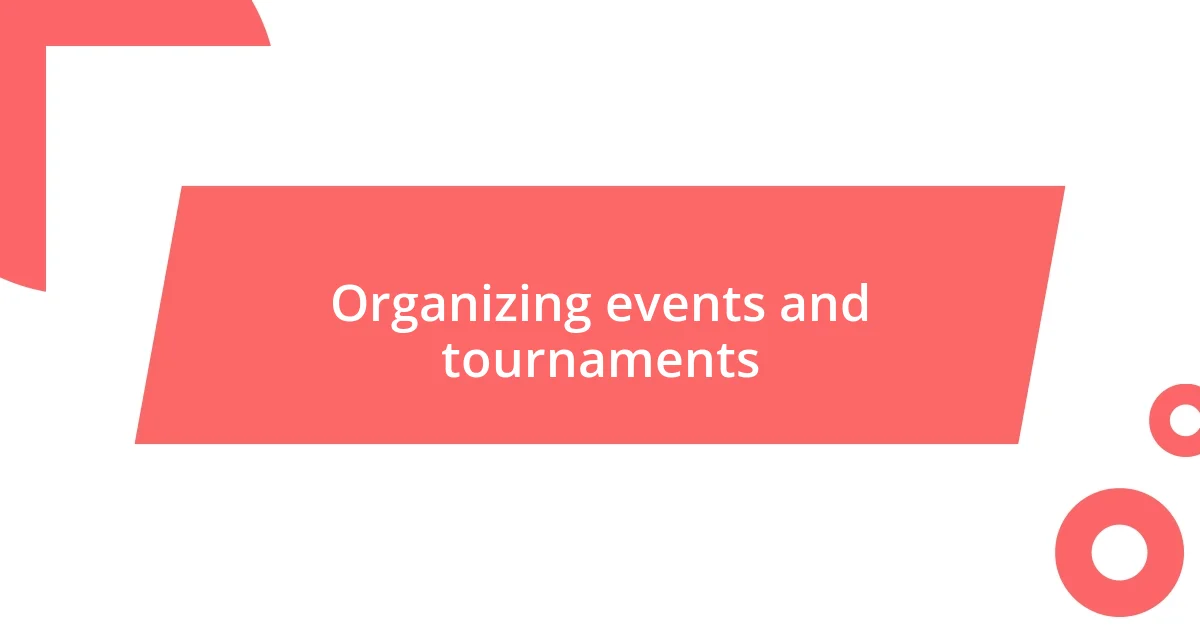
Organizing events and tournaments
Organizing events and tournaments within your gaming community is where the magic happens. I vividly recall my first tournament; it was both exhilarating and nerve-wracking! At first, I wasn’t sure how many participants would show up, but the moment I announced a prize for the winner, the excitement skyrocketed. Seeing the competitive spirit ignite among participants was priceless, and it made me realize the importance of incentives.
As I planned more events, I learned the significance of involving everyone in the process. I took a page from my own experiences and let members vote on the games to feature in upcoming tournaments. This collaboration not only made the events more inclusive but also created a buzz—who doesn’t enjoy sharing their favorite games? It’s like I opened a portal where everyone could bring their ideas to life, transforming a simple tournament into a community festival that everyone felt they had a stake in.
I also discovered that the atmosphere of the event greatly affects participation. I remember hosting a tournament in a casual setting with snacks, music, and lighthearted commentary. The laughter and friendly banter elevated the experience into something unforgettable. Have you ever been part of an event that just felt right? That’s how it was, and it made me realize that creating a welcoming environment can turn a tournament from just another match into a cherished memory for everyone involved.
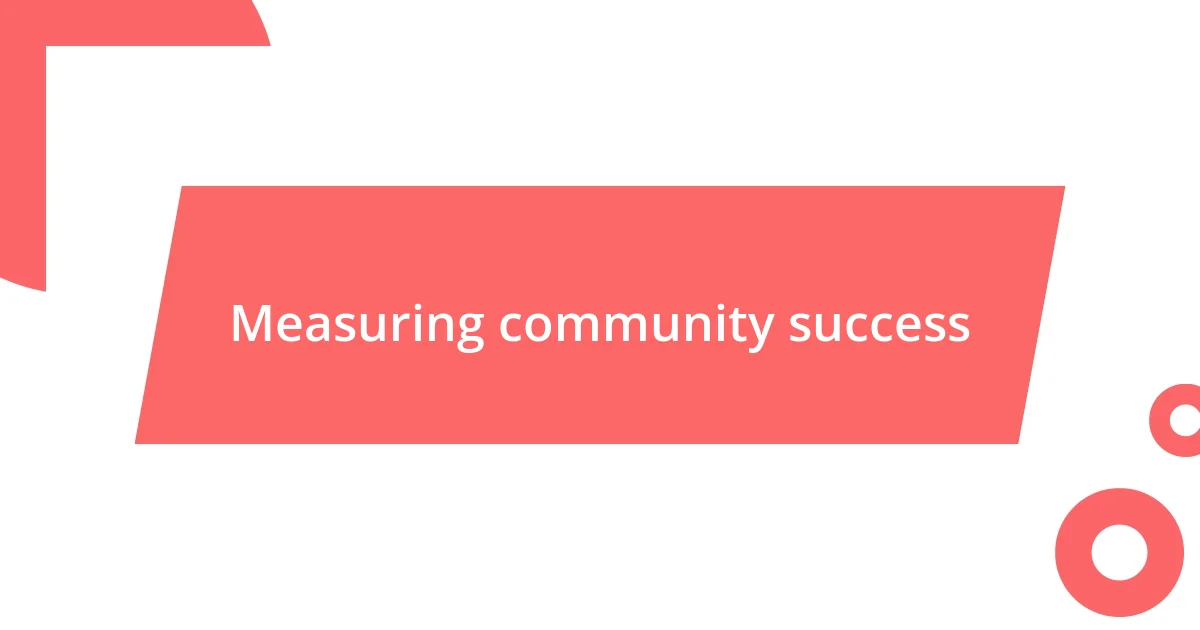
Measuring community success
When it comes to measuring the success of your gaming community, I’ve found that metrics can truly illuminate progress. For instance, I started tracking member engagement through active participation in forums and events. I’ll never forget the moment when we hit over 100 active participants in our chat channel during a weekly game night. It was an exhilarating confirmation that our efforts to foster interaction were working!
It’s also essential to consider feedback from community members. After a couple of events, I decided to conduct a quick survey, which revealed some surprising preferences. One member suggested a specific game night theme that hadn’t crossed my mind. The insight was eye-opening! Listening to your community not only helps refine your strategy but strengthens the bond between members when they see their ideas valued.
Another key indicator of success is the growth of your community over time. I remember when we reached our first milestone of 500 members; it felt monumental! But I learned that it’s not only about the numbers; it’s about the relationships built within the group. Have you ever looked at a group photo from an event and felt a surge of pride? That emotional connection is perhaps the most significant measure of success.



